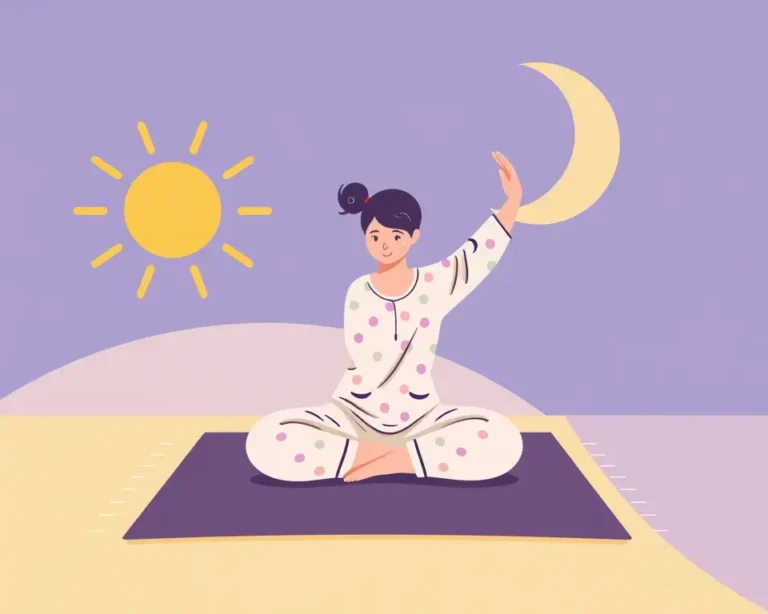Struggling to get a good night’s rest? The solution might not be what you expect. While many focus on evening routines to improve sleep, a growing body of evidence suggests that the key to unlocking better sleep could lie in your morning workout. Yes, you read that right. That a.m. sweat session might be the very thing you need to finally get those restful zzz’s.
The Science Behind Morning Exercise and Sleep
So, how does a morning workout translate to improved sleep quality? It all boils down to our body’s natural rhythms and hormone regulation.
Circadian Rhythm Reset
Our bodies operate on a roughly 24-hour internal clock known as the circadian rhythm, which regulates various physiological processes, including sleep-wake cycles. Exposure to sunlight and physical activity helps to synchronize this internal clock. A morning workout, especially outdoors, amplifies this effect. The sunlight suppresses melatonin, the sleep hormone, making you feel more alert during the day. Then, as evening approaches, your body is primed to produce melatonin at the appropriate time, promoting sleepiness.
Body Temperature Regulation
Exercise increases your core body temperature. While this might seem counterintuitive to sleep, the subsequent cool-down period after a workout can actually promote sleepiness. As your body temperature gradually drops, it signals to your brain that it’s time to rest. Morning workouts provide a longer window for this temperature regulation to occur before bedtime.
Stress Reduction and Mood Enhancement
Exercise is a well-known stress reliever. It helps to reduce levels of cortisol, the stress hormone, and increases the production of endorphins, which have mood-boosting effects. By starting your day with a workout, you can better manage stress and anxiety throughout the day, leading to a calmer state of mind before bed.
The Ideal Morning Workout for Better Sleep
Not all workouts are created equal when it comes to sleep enhancement. Here’s a breakdown of the best types of morning exercise for promoting restful nights:
Cardio: Energize Your Day, Tranquilize Your Night
Aerobic exercise, such as brisk walking, jogging, cycling, or swimming, is a fantastic choice for improving sleep. Aim for at least 20-30 minutes of moderate-intensity cardio most days of the week. The increased heart rate and oxygen intake help to invigorate you during the day while setting the stage for better sleep later on. If you’re new to cardio, start with shorter sessions and gradually increase the duration and intensity.
Resistance Training: Strength for Body and Sleep
Don’t underestimate the power of resistance training. Lifting weights or doing bodyweight exercises not only builds muscle but can also improve sleep quality. Resistance training can help regulate blood sugar levels, which can contribute to more stable sleep. Focus on compound exercises that work multiple muscle groups simultaneously, such as squats, lunges, push-ups, and rows. Aim for two to three resistance training sessions per week, with rest days in between.
Mind-Body Practices: Calm Your Mind, Improve Your Sleep
Yoga, Tai Chi, and Pilates are excellent choices for promoting relaxation and improving sleep. These practices combine physical postures, breathing techniques, and mindfulness, which can help to reduce stress and anxiety. Yoga, in particular, has sleep-friendly poses like child’s pose and legs-up-the-wall pose that are practically a lullaby for your body and mind. Aim for at least 30 minutes of these practices several times a week.
High-Intensity Interval Training (HIIT): A Word of Caution
While HIIT can be effective for burning calories and improving cardiovascular health, it’s generally not recommended as a morning workout for sleep improvement, especially if you’re sensitive to stimulants. The high-intensity nature of HIIT can elevate cortisol levels and leave you feeling wired, which can interfere with sleep if done too close to bedtime. If you enjoy HIIT, consider doing it in the late morning or early afternoon, allowing ample time for your body to recover before bed.
Crafting Your Morning Workout Routine
Ready to incorporate morning exercise into your daily routine? Here’s a step-by-step guide to help you get started:
1. Start Slowly
Don’t try to overhaul your entire routine overnight. Begin with just 15-20 minutes of exercise a few days a week and gradually increase the duration and frequency as you feel more comfortable.
2. Choose Activities You Enjoy
The key to sticking with a workout routine is to find activities that you genuinely enjoy. Experiment with different types of exercise until you find something that you look forward to doing.
3. Set Realistic Goals
Be realistic about what you can achieve. Don’t set unrealistic goals that will leave you feeling discouraged. Focus on making small, sustainable changes.
4. Prepare the Night Before
Lay out your workout clothes, pack your gym bag, and prepare a healthy breakfast the night before to make it easier to get out the door in the morning.
5. Make It a Habit
Consistency is key. Schedule your workouts into your calendar and treat them like any other important appointment.
6. Listen to Your Body
Pay attention to your body and rest when you need to. Don’t push yourself too hard, especially when you’re just starting out.
Other Factors That Influence Sleep
While morning exercise can significantly improve sleep, it’s important to address other factors that can affect your sleep quality:
Create a Relaxing Bedtime Routine
Establish a consistent bedtime routine to signal to your body that it’s time to sleep. This might include taking a warm bath, reading a book, or listening to calming music.
Optimize Your Sleep Environment
Make sure your bedroom is dark, quiet, and cool. Use blackout curtains, earplugs, or a white noise machine to minimize distractions.
Watch Your Diet and Caffeine Intake
Avoid heavy meals, caffeine, and alcohol close to bedtime. These substances can interfere with your sleep.
Limit Screen Time Before Bed
The blue light emitted from electronic devices can suppress melatonin production. Avoid using smartphones, tablets, and computers for at least an hour before bed.
Potential Drawbacks and Considerations
While morning workouts offer numerous benefits, there are a few potential drawbacks to consider:
Time Constraints
Finding time for exercise in the morning can be challenging, especially if you have a busy schedule. Experiment with different workout times to see what works best for you. Even a short 15-minute workout is better than no workout at all.
Muscle Soreness
If you’re new to exercise or increase the intensity of your workouts too quickly, you may experience muscle soreness. Start slowly and gradually increase the intensity of your workouts.
Individual Differences
Everyone responds differently to exercise. What works for one person may not work for another. Experiment with different types of exercise and workout times to find what works best for you.
Real-Life Examples
Still not convinced? Here are a few real-life examples of how morning workouts have helped people improve their sleep:
- Sarah, a 35-year-old teacher: “I used to toss and turn all night, but since I started doing yoga every morning, I’ve been sleeping like a baby. The stretching and breathing exercises really help me relax.”
- John, a 42-year-old accountant: “I never thought I was a morning person, but I started running before work, and it’s completely changed my life. I have more energy during the day, and I sleep much better at night.”
- Maria, a 50-year-old nurse: “I started lifting weights in the morning, and it’s made a huge difference in my sleep. I feel stronger and more confident, and I fall asleep much faster.”
Conclusion: Unlock Better Sleep with a Morning Sweat
If you’re struggling to get a good night’s sleep, consider incorporating morning exercise into your daily routine. Whether it’s cardio, resistance training, or mind-body practices, a morning workout can help to synchronize your circadian rhythm, regulate your body temperature, reduce stress, and improve your overall mood, leading to better sleep quality. Remember to start slowly, choose activities you enjoy, and listen to your body. With a little consistency and effort, you can unlock the secret to better sleep and wake up feeling refreshed and energized every day.







